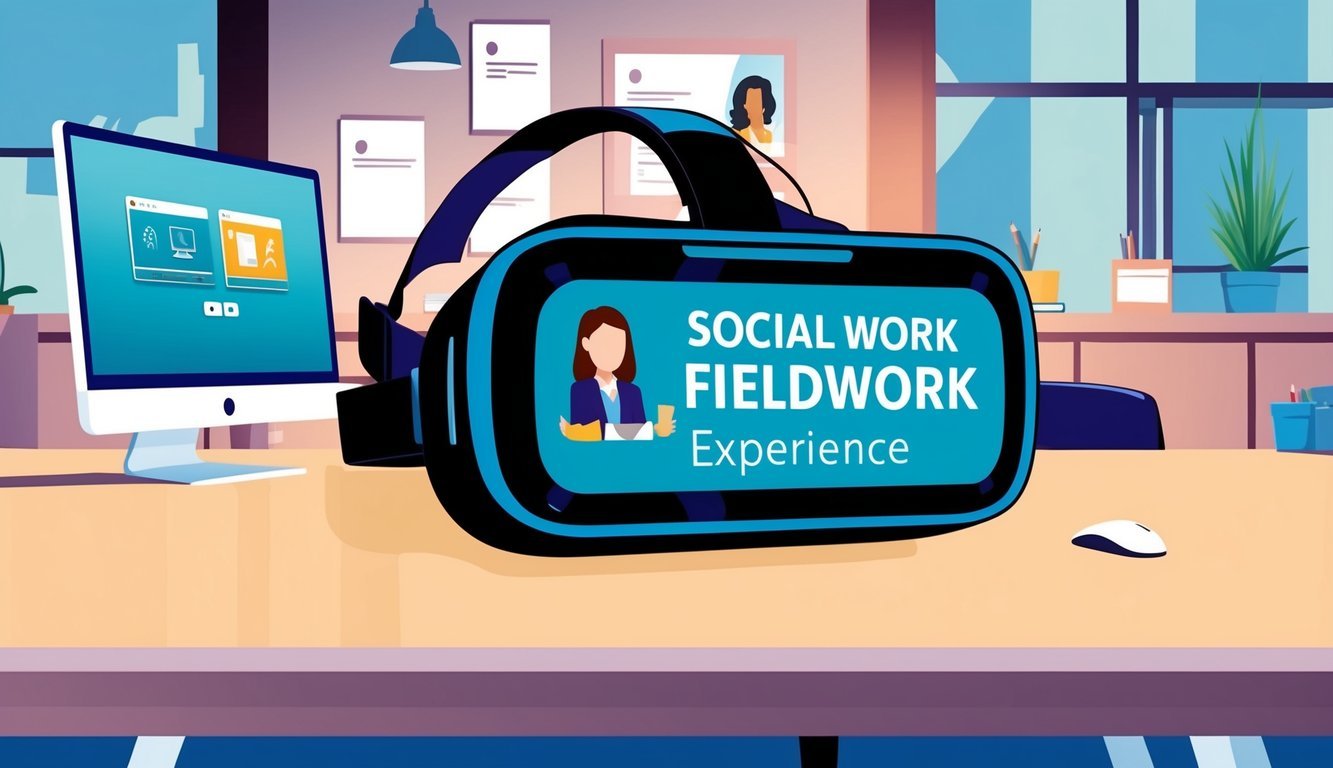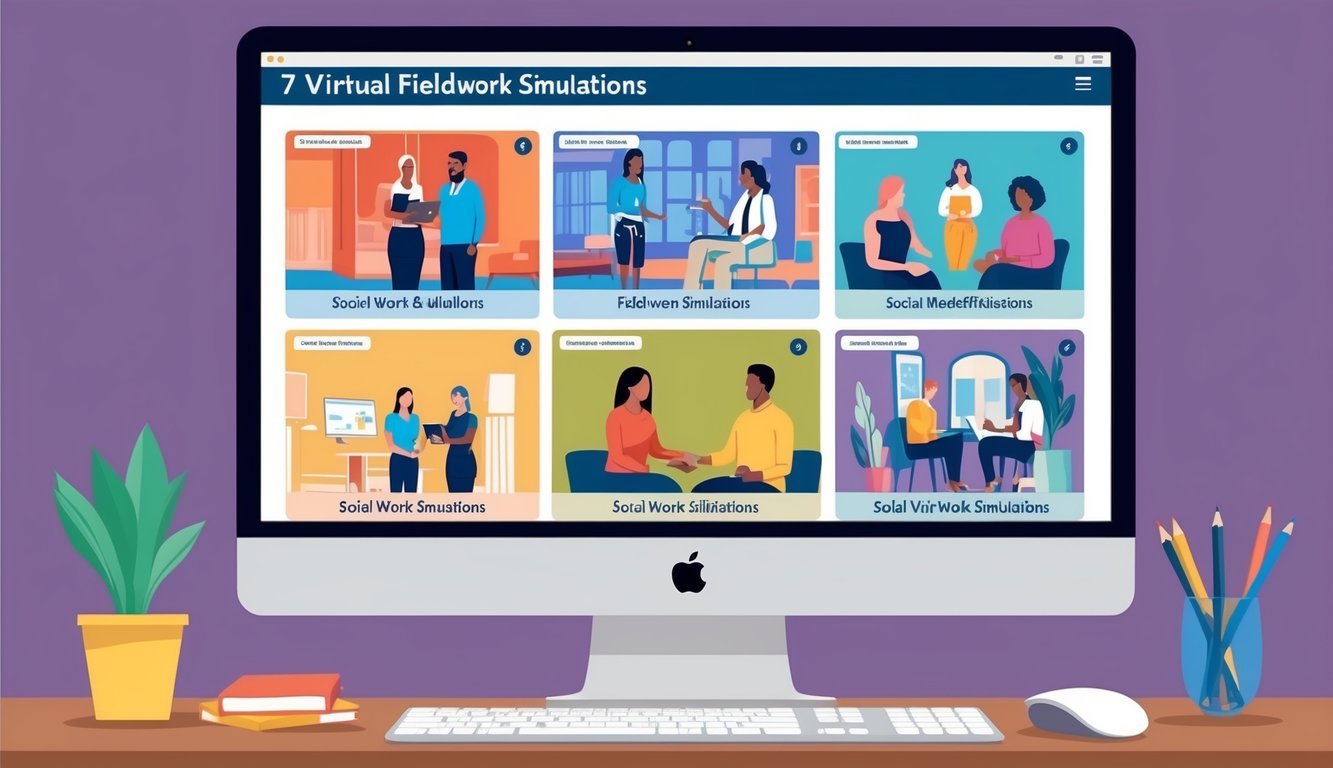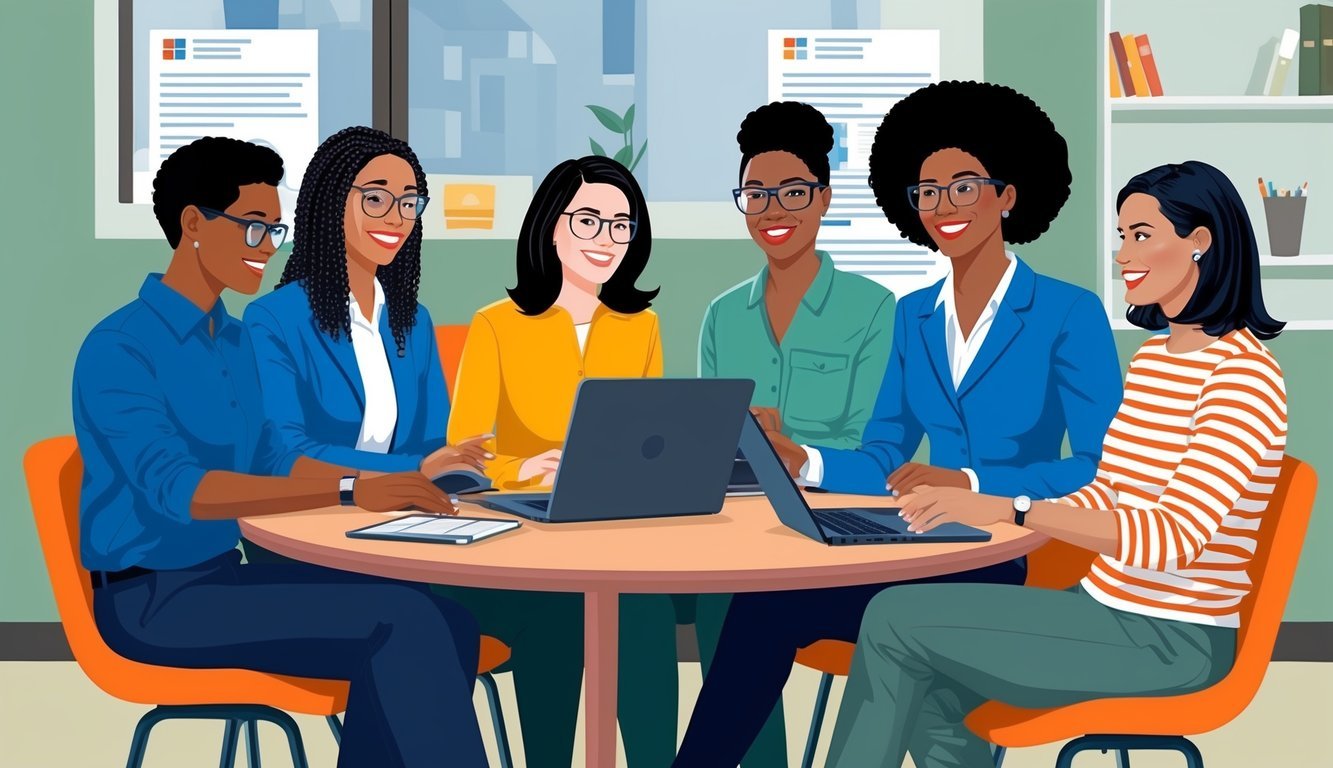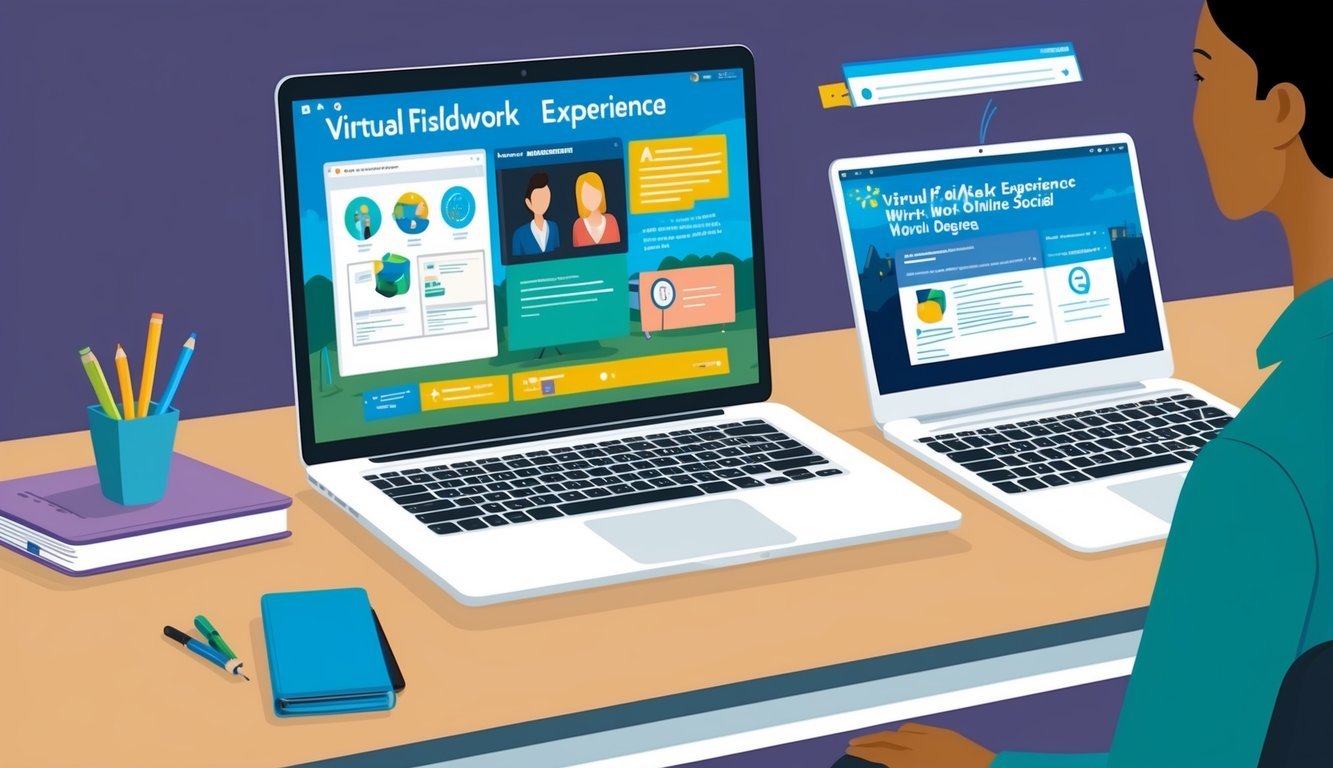Thinking about pursuing an online degree in social work? You’re probably wondering how you can gain practical experience without being physically present, right? As online degrees grow in popularity, it’s vital for students to have accessible ways to get hands-on experience—enter virtual fieldwork.
This is where the magic happens!

Virtual fieldwork lets you complete your social work internship from just about anywhere, opening up all sorts of opportunities for practical learning. It’s not just about applying what you learn in theory; it’s about getting ready for the real-world challenges you’ll tackle.
Whether you’re juggling work, family, or other responsibilities, this approach helps you hone essential skills without straining your schedule.
1) Virtual Reality Role-Plays

Imagine slipping on a virtual reality headset and stepping into a real-life scenario in the comfort of your living room.
That’s the beauty of virtual reality role-plays! You’ll find it’s a super cool way to develop practical experience in social work.
These interactive scenarios help you build the interpersonal skills you’ll need when talking to clients.
Picture yourself simulating complex client interviews or crisis interventions, which can be a bit like playing a video game where the stakes are real.
You’ll enhance your problem-solving and critical thinking skills, too! And guess what? You can practice as often as you like, which gives you the chance to improve and try out different approaches until you get it just right.
The instant feedback is a real game-changer.
Instructors and fellow students can watch your performance and share their thoughts, helping you adjust quickly.
It’s like having a coach in your corner cheering you on!
2) Case Study Simulations

If you’re studying social work online, case study simulations are your best friends.
They deliver hands-on practice that helps you develop essential skills right from the comfort of your own home.
You can dive into different scenarios and see how you’d respond to real-life situations with clients.
These simulations feature handy decision-making tools that guide your journey, making the learning experience much more engaging.
Plus, you’ll get immediate feedback to see where you shine and where there’s room for improvement.
Some programs even use video simulations, which are fantastic for sharpening your practical skills.
They’re like a sneak peek into the real-world challenges you might face as a social worker.
Add in virtual community mapping for a well-rounded perspective, and you’re on your way to mastering the field!
3) Interactive Community Tours
Who doesn’t love a good tour? Interactive community tours let you explore different environments from your couch.
You’ll investigate various community settings and get a feel for their social dynamics and unique challenges.
It’s like getting an inside look at the world of social work!
During these tours, you’ll encounter real-world scenarios that help sharpen your observational skills and let you connect those dots between classroom theories and real-life applications.
You’ll gain confidence while immersing yourself in diverse communities—all without the hassle of travel!
These tours also cater to all types of learners—whether you’re a listener, a visual learner, or you learn best by doing.
They adapt to your style while making your virtual learning journey much richer.
Online Counseling Skills Labs

Ever wished you could practice counseling in a safe, supportive environment? Online counseling skills labs give you just that! These labs often involve role-playing with your peers, allowing you to practice your counseling techniques under the watchful eye of experienced instructors.
It’s like a dress rehearsal before the big show!
With real-time feedback and structured guidance, you’ll build your confidence while applying what you’ve learned.
Many programs also connect you with the best online courses for data science.
Mixing these skills with your social work education prepares you to tackle whatever challenges come your way.
Being in a virtual lab gives you the flexibility to fit sessions into your busy life.
No travel time, no hassle—just the chance to learn and grow!
5) Digital Shadowing Programs
Ever wondered what a day in the life of a seasoned social worker looks like? Digital shadowing programs let you peer into their world! You get to observe professionals as they navigate daily challenges, which is a real eye-opener.
This experience allows you to see how they apply theories in real-world situations—learning from their decisions and interactions without being there in person.
It’s like binge-watching a great documentary where you can ask questions in real-time—talk about an educational experience!
By engaging with experienced professionals like this, you’ll boost your confidence and get a solid grounding in the skills needed for your future career.
6) Virtual Advocacy Projects

Ready to make a difference? Virtual advocacy projects let you roll up your sleeves and engage in initiatives that promote social justice—all from your own home.
You’ll find your voice and collaborate with like-minded individuals passionate about making a change.
Think about working on online campaigns or creating digital content that raises awareness on important topics.
For instance, you could team up with a local organization to whip up a social media strategy that spreads your message far and wide.
It’s the chance to truly make an impact in today’s world.
Crafting messages for different audiences is key, and you’ll learn to tailor your communications, which is crucial for effective advocacy.
You’ll not only enhance your experience but also prepare yourself for some of the challenges you’ll face as a social worker.
Web-Based Group Supervision

Have you ever wished you could chat about challenging cases with peers and supervisors without having to be in the same room? Web-based group supervision brings that opportunity right to your screen! It’s an excellent way to connect with others and deepen your understanding of real-world issues.
In these sessions, you’re free to discuss cases and seek support in developing your professional identity.
This shared experience fosters collaboration and open communication.
Don’t be shy—share your thoughts and challenges! The more you participate, the more you’ll grow.
Plus, the flexibility of online supervision makes it easier for you to juggle your studies and other commitments.
You can tackle your fieldwork requirements without feeling overwhelmed.
Benefits of Virtual Fieldwork Experiences

Let’s talk benefits! Virtual fieldwork experiences serve up unique perks that cater to your learning style.
They enhance flexibility, accessibility, and help sharpen essential skills—all while creating an engaging educational journey for social work students.
Flexibility and Accessibility
First off, the flexibility is fantastic.
You get to engage in case studies and fieldwork exercises when it suits you.
Whether you’re an early bird or a night owl, virtual platforms let you access materials whenever you want.
Perfect for balancing work, family, and school!
Plus, there’s the huge bonus of accessibility.
Say goodbye to geographic limitations! You can tap into programs and experiences that might have been out of reach otherwise.
Connecting with diverse communities online enriches your understanding of social work dynamics and widens your professional horizons.
Skill Development
Virtual fieldwork is a goldmine for honing skills crucial in today’s social work practice.
You’ll get the hang of conducting online discussions, leading virtual advocacy campaigns, and collaborating with teammates from afar.
Let’s face it—these skills are becoming more necessary as client interactions head online.
What’s more, you’ll learn to be reflective and proactive as you navigate complex scenarios.
Engaging with these experiences encourages you to take charge of your learning journey while boosting your confidence.
Integrating Technology in Social Work Education

Technology’s shaking things up in social work education, bringing innovative tools for learning right to your fingertips.
Virtual reality and simulation-based training are at the forefront, making learning more accessible and interactive.
Virtual Reality Applications
Have you thought about how virtual reality (VR) is changing the game? With VR, you can immerse yourself in environments that mimic real-life situations and develop your practical skills.
It’s like role-playing without ever leaving your house.
Using VR allows you to practice difficult conversations in a safe space, helping you to build empathy and understanding along the way.
As this technology continues to advance, who knows what else it’ll bring to social work education?
Simulation-Based Training
Simulation-based training is more than just a buzzword—it’s a powerful tool for your educational journey.
By diving into digital simulations, you can practice handling various social work scenarios and responding to challenges without the pressure of a real-world situation.
It’s like a rehearsal before the big performance, helping you feel more confident when interacting with real clients.
Programs like e-intervention prepare you for tech-mediated practices, making sure you can integrate digital tools into your future career seamlessly.
In short, simulation-based training bridges the gap between theory and practice, setting you up for success as you step into the field.

